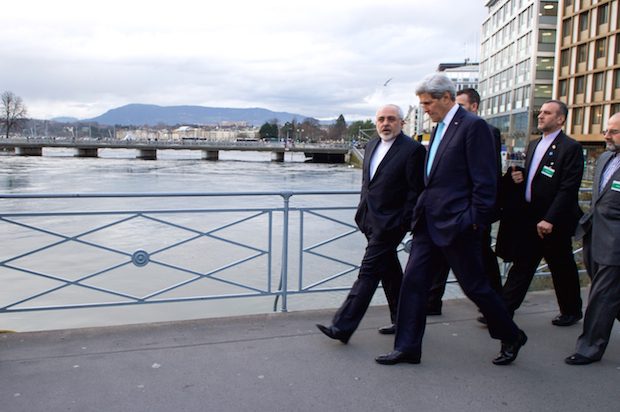The Politics of the Nuclear Deal

Jonathan Bernstein considers the Lausanne agreement’s domestic political implications. Here he makes a questionable claim:
Most Republican presidential candidates will oppose the deal and try to out-tough one another, though without making a commitment to a full-out invasion of Iran. The outlier is Rand Paul, whose prospects will continue to suffer, even as peace provides excellent fodder for the party’s hawks. So to the extent the agreement holds, it should tend to help candidates willing to call for military intervention [bold mine-DL].
That isn’t entirely wrong, but it skips over a few things. I agree that all or almost all Republican candidates will oppose the deal. The main differences between them will be over how quickly and emphatically they pledge to overturn it. Most of them will play coy and stop short of calling for military action (and they will feign taking offense at being labeled warmongers), but they will keep promoting the fantasy that tougher sanctions would have forced Iranian capitulation. This line will help them with hard-liners in their party, especially among the pundits and policy professionals, but it will reinforce the image of the party as too aggressive and too reliant on coercive measures overseas. It will probably also paint them as out of touch and excessively ideological. It’s just not very smart positioning for the eventual nominee, who has to be able to demonstrate that he isn’t another advocate for “omni-directional belligerence.”
There is broad public support for a diplomatic resolution of the nuclear issue. This seems even more pronounced in several competitive swing states. Barring a collapse in the talks, which now seems less likely, virtually every Republican candidate will be railing against a successfully-negotiated deal that the public backs. That may not be a huge disadvantage, but it’s certainly not going to help any of them. Both Walker and Rubio are on record saying that they would ignore what our allies in Europe think and would repudiate the deal. Jeb Bush has announced his opposition. That may be what they want to hear at AEI, but I suspect that it makes them come across to a great many Americans as diplomatically inept.
By itself, opposition to the deal may not sway many voters one way or the other, but it will make it harder for these candidates to get a hearing beyond their usual hawkish audiences. If this were an isolated case of opposing one deal, that would be one thing, but for all intents and purposes the position that virtually the entire field has taken is the rejection of diplomatic engagement itself. These candidates have had to adopt increasingly hard-line positions on Iran to placate the party’s ideological enforcers on these issues, and because of that they appear to everyone else to be actively hostile to any and all diplomacy. Combined with the GOP field’s lack of foreign policy experience, that is very likely to be a drag on whoever emerges as the nominee. If the eventual nominee could point to a record of good foreign policy judgment in the past, that could make criticisms of the nuclear deal a bit more persuasive. When criticisms are made by candidates with little or no relevant experience, they are more likely to be received as carping from people that don’t know what they’re talking about. When it comes to Iran and the nuclear issue, that perception will be grounded in reality.
Comments